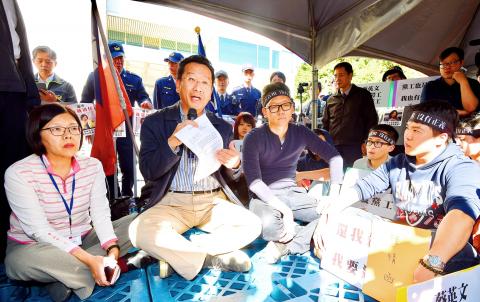Ill-gotten Party Assets Settlement Committee Chairman Wellington Koo (顧立雄) yesterday confirmed the failure of an attempt to reach a deal with the Chinese Nationalist Party (KMT) over controversial assets owned by the party and two companies affiliated with it.
According to an article in the Chinese-language United Evening News, the committee was close to reaching an administrative contract with the KMT over the assets of two KMT-owned companies — Central Investment Co (中央投資公司) and Hsinyutai Co (欣裕台) — as well as nine checks issued under a KMT account worth NT$468 million (US$14.64 million), but the KMT terminated negotiations with the committee.
Under the terms of the contract, the KMT would be obligated to transfer 55 percent of its holdings in the two companies to the government and donate the remaining 45 percent to fund long-term care and healthcare services.

Photo: Peter Lo, Taipei Times
The committee last month declared the two companies — which have a combined value of about NT$15.6 billion — KMT-affiliated organizations, and said they should be transferred to the state since they were founded using illegally obtained assets, but the Taipei High Administrative Court on Friday last week suspended the transfer.
Koo yesterday confirmed the existence of the contract, but denied accusations that the committee was engaged in under-the-table dealings.
“The Administrative Procedure Act (行政程序法) authorizes government authorities to negotiate an administrative contract, and the committee is not the first agency attempting to reach such a contract with a civic group,” Koo said.
“KMT Vice Chairman Steve Chan (詹啟賢) took the initiative to contact and negotiate with the committee over the ordered transfer of Central Investment and Hsinyutai to the government, as well as the nine checks” frozen by the committee, he said.
Koo reiterated that it was not the committee that took the initiative, adding that the negotiations were conducted according to the law and with the participation of the Ministry of Justice and the Ministry of Finance, but the committee failed to reach an agreement with the KMT.
Koo said he did not understand why the KMT backed out of the contract, but speculated that Chan might not be fully authorized to negotiate such an agreement.
Meanwhile, KMT members yesterday protested outside the committee’s headquarters over a freeze on KMT bank accounts, which they said prevented the party from paying salaries and pensions, and they demanded that the committee allow the KMT to make the payments.
Showing a document the committee issued to the KMT, Koo told the protesters that the committee had allowed the party to access about NT$922 million from the nine checks and a KMT account, as well as a payment owed to the KMT by the Chang Yung-fa Foundation (張榮發基金) to pay for party employees’ salaries, pensions and health insurance.
“I do not know why the KMT did not tell you” about the committee’s decision, he said.

The Taiwanese passport ranked 33rd in a global listing of passports by convenience this month, rising three places from last month’s ranking, but matching its position in January last year. The Henley Passport Index, an international ranking of passports by the number of designations its holder can travel to without a visa, showed that the Taiwan passport enables holders to travel to 139 countries and territories without a visa. Singapore’s passport was ranked the most powerful with visa-free access to 192 destinations out of 227, according to the index published on Tuesday by UK-based migration investment consultancy firm Henley and Partners. Japan’s and

NATIONAL SECURITY THREAT: An official said that Guan Guan’s comments had gone beyond the threshold of free speech, as she advocated for the destruction of the ROC China-born media influencer Guan Guan’s (關關) residency permit has been revoked for repeatedly posting pro-China content that threatens national security, the National Immigration Agency said yesterday. Guan Guan has said many controversial things in her videos posted to Douyin (抖音), including “the red flag will soon be painted all over Taiwan” and “Taiwan is an inseparable part of China,” while expressing hope for expedited “reunification.” The agency received multiple reports alleging that Guan Guan had advocated for armed reunification last year. After investigating, the agency last month issued a notice requiring her to appear and account for her actions. Guan Guan appeared as required,

Japan and the Philippines yesterday signed a defense pact that would allow the tax-free provision of ammunition, fuel, food and other necessities when their forces stage joint training to boost deterrence against China’s growing aggression in the region and to bolster their preparation for natural disasters. Japan has faced increasing political, trade and security tensions with China, which was angered by Japanese Prime Minister Sanae Takaichi’s remark that a Chinese attack on Taiwan would be a survival-threatening situation for Japan, triggering a military response. Japan and the Philippines have also had separate territorial conflicts with Beijing in the East and South China

A strong cold air mass is expected to arrive tonight, bringing a change in weather and a drop in temperature, the Central Weather Administration (CWA) said. The coldest time would be early on Thursday morning, with temperatures in some areas dipping as low as 8°C, it said. Daytime highs yesterday were 22°C to 24°C in northern and eastern Taiwan, and about 25°C to 28°C in the central and southern regions, it said. However, nighttime lows would dip to about 15°C to 16°C in central and northern Taiwan as well as the northeast, and 17°C to 19°C elsewhere, it said. Tropical Storm Nokaen, currently